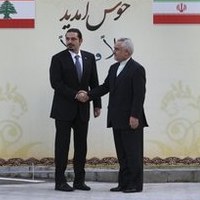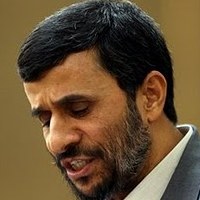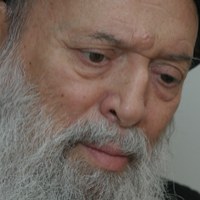![]()
Sun, April 17, 2011 | The Meir Amit Intelligence and Terrorism Information Center

Iranian clerics holding up anti Saudi King Abdullah bin Abdul Aziz placards face riot policemen during a protest in front of the Saudi embassy in Tehran on March 17. Hundreds of Iranians have stoned the Saudi consulate in the northeastern city of Mashhad to protest the killing of Shiites in Bahrain.
Iranian Press Criticizes Persian Gulf Rulers
The tensions between Iran and the Persian Gulf states have escalated in recent days on the backdrop of the ongoing political crisis in Bahrain and the exposure of Iranian spy networks in Kuwait operated by the Revolutionary Guards, according to Kuwaiti authorities. This week, Iran expelled three Kuwaiti diplomats in response to last week’s expulsion of three Iranian diplomats from Kuwait accused of espionage.
Senior officials in the Persian Gulf have repeatedly accused Iran of meddling in Bahrain’s internal affairs, political subversion in Persian Gulf states, and fanning ethnic tensions in the region. At the same time, top Iranian officials warned Saudi Arabia against escalating the situation in the Persian Gulf following the deployment of its military forces in Bahrain. As tensions escalate between Iran and the Persian Gulf states, in recent days Iranian press has also stepped up its attacks on the Persian Gulf rulers.
The conservative daily Qods accused the rulers of Bahrain and Saudi Arabia of “genocide” and slaughter of innocent civilians who only wanted to realize their civil rights. An editorial published by the daily says that Saudi Arabia’s meddling in the events in Bahrain and deployment of military forces to that country in an attempt to suppress the rightful demands of Bahrainis are tantamount to occupation and crimes of war. The daily also criticized the silence of Muslim countries’ rulers over the crimes committed in Bahrain.
Speaking about the recent accusations from the leaders of the Gulf Cooperation Council (GCC) about Iran’s involvement in Persian Gulf states, the daily claimed that those “false allegations” reflect the concerns of the Persian Gulf states’ rulers over the popular uprisings in their countries. The daily claimed that the Islamic revolution in Iran was the result of spilling innocent blood by the Shah’s regime and that in Islamic countries, particularly Bahrain, the will of the people will eventually triumph over the oppression and tyranny of bloodthirsty rulers (Qods, April 7).
The daily Keyhan also addressed the events in Bahrain, strongly criticizing the silence of international organizations over the crimes committed by Saudi Arabia in that country. The daily said that what Saudi Arabia is doing in Bahrain with the GCC’s support is a “crime against humanity” and “state-sponsored terrorism”. Keyhan wondered why the UN Human Rights Council remains silent over the arrest of hundreds of political activists in Bahrain, preferring to condemn Iran rather than Saudi Arabia, which cooperates with Israel’s intelligence services and sends its military forces to Bahrain to suppress the people of that country (Keyhan, April 11).
Strong criticism against the rulers of Saudi Arabia was also made by the conservative daily Siasat-e Rouz. According to the daily, Saudi Arabia could play a major role in the advancement of regional stability and the rightful demands of Arab peoples in view of its particular position among Arab and Muslim countries. Instead, Saudi Arabia serves Western interests and its involvement in the suppression of Arab peoples in the Middle East and North Africa has provoked anger from the Arab nations.
The daily accused Saudi Arabia of acting in service of the West to instigate a conflict between Sunnis and Shi’ites instead of playing a role in the establishment of Islamic unity. The daily also accused the rulers of Saudi Arabia of helping the West promote the campaign designed to demonize Iran, giving Israel the go-ahead to continue the massacre in Gaza, the West Bank, and Jerusalem, and playing a part in the attempt to weaken the resistance front led by Iran, Syria, and Lebanon in accordance with the desires of the Zionists and the West. The daily warned the rulers of Saudi Arabia that their current policy does not serve the interests of their country. For Saudi Arabia to be able to fulfill its true role in the region, it needs to stop serving Western interests, distance itself from Western and Zionist schemes, and abandon its current policy in light of the regional developments. This policy will likely escalate the crisis and isolation facing Saudi Arabia, and only by changing its policy will it be able to restore its regional and global status and regain the sympathy of the public (Siasat-e Rouz, April 11).
Revolutionary Guards weekly Sobh-e Sadeq also dedicated its editorial to the developments in the Persian Gulf and addressed the warnings made by the GCC leaders against Iran at the organization’s conference last week. According to the weekly, the GCC charter is designed to protect its members against outside aggression, and the GCC leaders have no right to use the council’s military force to suppress the people of the Persian Gulf states. No charter can justify crimes against the people of a country, and those who wish to protect human rights cannot be accused of meddling in the internal affairs of a country. The Revolutionary Guards weekly referred to the Saudi and UAE military forces operating in Bahrain and to the rulers of Bahrain, Saudi Arabia, and the UAE as “criminals” (Sobh-e Sadeq, April 11).
The rulers of Kuwait also came under harsh criticism from Iranian press. The conservative daily Jomhuri-ye Eslami accused the rulers of Kuwait of running a psychological campaign against Iran under the instructions of Islam’s enemies. The daily noted that, during the Iran-Iraq War, Kuwait had put all of its resources at the disposal of the Iraqi “war machine” and took a hostile stance towards Iran. Nevertheless, Iran condemned Iraq’s invasion into Kuwait in 1990 and demanded that Saddam Hussein end the occupation of Kuwait. According to Jomhuri-ye Eslami, Kuwait’s current conduct indicates that its rulers have not learned the lessons of the past. The daily warned the rulers of the emirate that they should not put Iran’s anger to the test unless they want to suffer the same fate as the rulers of Egypt, Tunisia, Libya, and Yemen. They must understand that the time of hereditary dynasties has come to an end and that they cannot rely on the Americans to save their thrones (Jomhuri-ye Eslami, April 12).



 RSS
RSS










Iranian Press Criticizes Persian Gulf Rulers | #Iran #SaudiArabia #Bahrain #Shia #Sunni http://j.mp/gZaiL5
RT @CrethiPlethi: Iranian Press Criticizes Persian Gulf Rulers | #Iran #SaudiArabia #Bahrain #Shia #Sunni http://j.mp/gZaiL5